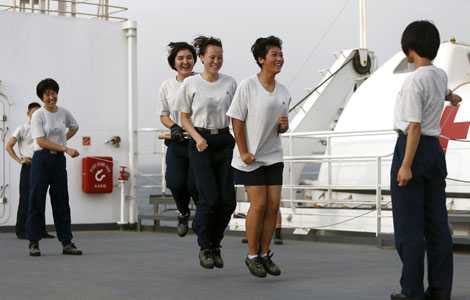China-Central Asia ties facilitate regional development
Updated: 2013-09-08 16:18
(Xinhua)
|
|||||||||||
BEIJING - In a speech delivered at Kazakhstan's Nazarbayev University Saturday, visiting Chinese President Xi Jinping proposed for the first time the joint establishment of a "Silk Road economic belt" to boost cooperation between China and Eurasian countries.
The grand regional cooperation structure, Xi believed, can be set up through "strengthening policy communication, road connections, trade facilitation, currency circulation and heart connection."
Over the past two decades, the relationship between China and Eurasian countries has seen fast development, with railways and highways, oil and gas pipelines, electricity and telecommunications facilities forming a vast network across region that facilitates a massive flow of commodities, resources and capital.
With a total population of 3 billion and an unparalleled market both in scale and potential, the proposed economic belt will help countries in Eurasia, which have highly complementary economies and huge potential for future cooperation, turn their latent advantages in population, resources, market and technology into momentum for development and, in turn, further expand their opening-up and cooperation.
Greater cooperation will also help ensure stability through development in the region, where the "three evil forces" of terrorism, extremism and separatism have a strong presence. There has been broad consensus to build a harmonious region featuring lasting peace and common prosperity.
China has witnessed an average annual increase of 30.8 percent in trade with Central Asian, Western Asian and Southern Asian countries over the past decade. The proposed economic belt will add fresh impetus to China's drive to develop its west and will bring an additional source of growth in its foreign trade and investment.
The current growing trend toward world economic integration and increased regional cooperation also creates an opportune moment to revive the historical Silk Road. The call for greater regional cooperation also coincides with an eastward shift of the world's economic weight as well as the rise of emerging economies, which have become an important world economic engine since the 2008 financial crisis, and will help foster the integration and restructuring of Eurasian economies.
From a broader perspective of human development, the Silk Road had served as a bond linking the Chinese, Islamic, Slavic, Indian and Persian civilizations. It is believed that the innovative cooperative mode of the economic belt will revive the brilliant Silk Road, strengthen economic ties and advance cooperation among countries along the ancient trade route.
As Xi put it in his speech, the 2,000-plus year history of contact has demonstrated that nations with different racial, religious and cultural backgrounds may well share peace and common development as long as they stick to principles such as unity, equality, cooperation, accommodation, mutual trust and mutual benefit.
Related Stories
Xi's speech on China-Central Asia ties catches global attention 2013-09-08 13:32
Xi urges Chinese, Kazakh entrepreneurs to boost cooperation 2013-09-08 11:44
Cooperation with Kazakhstan enjoys broad prospect: Xi 2013-09-08 10:29
Xi discusses bilateral ties with Kazakh parliament speaker 2013-09-08 10:09
Xi proposes a 'new Silk Road' with Central Asia 2013-09-08 07:25
Today's Top News
Chinese president arrives in Uzbekistan for visit
Exports expand in August
Belgian PM 'confident' in China's economy
Beijing set to host global tourism center
Proposal requires bars to ban minors
Liu Zhijun associate charged
Network to take care of mentally ill
Guangzhou to end labor camps
Hot Topics
Lunar probe , China growth forecasts, Emission rules get tougher, China seen through 'colored lens', International board,
Editor's Picks

|

|

|

|

|

|





